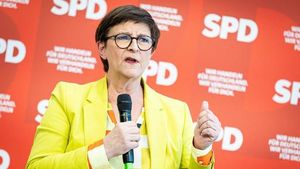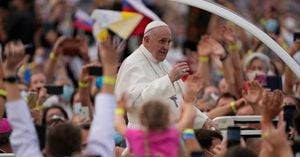In a heated presidential debate organized by Super Express on April 28, 2025, candidates faced intense questioning on critical issues, including the legalization of abortion. The format allowed participants to ask each other questions, creating a dynamic atmosphere that challenged them to move beyond standard responses.
One of the standout moments occurred when Magdalena Biejat, a candidate from the Left party, confronted Sławomir Mentzen, a representative of the Confederation. Biejat referenced a tragic incident from two years prior, where a 14-year-old intellectually disabled girl in Podlasie was raped by her uncle and became pregnant. She pressed Mentzen on whether he would support legislation that would prevent such a victim from obtaining an abortion.
Mentzen's response was stark. "Such a terrible case happens once a year," he stated, emphasizing that rare incidents should not dictate policy. He expressed a desire for fewer such incidents, arguing that the current political approach should shift to reduce crime rates, particularly sexual violence. He added, "To make these cases rarer, we need to implement a completely different policy than yours," referring to Biejat's party.
During the debate, Mentzen also made controversial claims regarding the increase in reported rapes in the UK, stating that the number had surged sevenfold over the past 20 years, from 10,000 to 70,000 annually. His assertions sparked discussions about the broader implications of crime statistics and the methodologies behind them. He further claimed that Stockholm has become the 'capital of rapes,' a statement that has drawn scrutiny for its accuracy.
In a separate but equally contentious issue, Mentzen criticized the current abortion law in Poland, describing it as allowing for inhumane practices. He cited a case in Oleśnica where a child in the ninth month of pregnancy was purportedly killed with an injection of potassium chloride directly into the heart. This shocking claim aimed to highlight what he sees as the moral failures of the current legal framework regarding abortion.
Mentzen's comments have not gone without backlash. Critics argue that his statistics and assertions are misleading and fail to address the complexities surrounding crime and abortion laws. For instance, Aleksandra Zaprutko-Janicka, a journalist from Wirtualna Polska, pointed out that Sweden's high rape statistics are largely due to its reporting practices and broader definitions of rape, which differ from those in many other countries.
The debate format, where candidates posed questions to each other, contributed to a lively exchange that diverged from typical political rhetoric. This approach allowed for a more engaging discussion but also led to a number of statements that some observers deemed disconnected from reality. Proposals ranged from establishing a National Guard to banning opinion polls and preventing the so-called "Banderization" of public life.
As the election approaches, the 13 candidates vying for the presidency are making their positions known. Alongside Mentzen and Biejat, notable figures include Artur Bartoszewicz, Grzegorz Braun, Szymon Hołownia, and Rafał Trzaskowski, each bringing their perspectives to the table. The diversity of candidates reflects a wide array of opinions on pressing national issues.
In a related discussion, Mentzen expressed his views on the treatment of religious organizations, stating he believes churches and faith-based groups should be treated the same as other organizations in terms of land purchases. He opposes any arrangement that allows these organizations to acquire land at significantly reduced prices. His comments come in light of a report from the SOISH association, which revealed that local governments have disposed of properties to churches for a fraction of their market value, raising questions about fairness and accountability in such transactions.
The report highlighted that between 2015 and 2021, local governments sold properties worth over 30 million PLN to religious organizations for just over 4 million PLN. Additionally, it was noted that the National Support Centre for Agriculture transferred land valued at nearly 5.7 million PLN to the Catholic Church without charge. Such findings have fueled ongoing debates about the relationship between the state and religious institutions in Poland.
The presidential candidates are navigating a complex political landscape as they prepare for the upcoming election. The issues of abortion, crime, and the role of religious organizations are at the forefront of public discourse, with candidates like Mentzen and Biejat embodying the polarized views that characterize this election cycle.
As the campaign unfolds, voters are left to grapple with the implications of each candidate's stance on these critical issues. The debate not only served as a platform for candidates to express their views but also highlighted the deep divisions within Polish society regarding morality, legality, and the role of government in personal matters.
With the election drawing near, the stakes are high, and the candidates' performances in debates like this will undoubtedly influence public opinion and voter turnout. As they continue to articulate their visions for Poland's future, the conversations around these pivotal topics will likely persist, shaping the political landscape for years to come.




